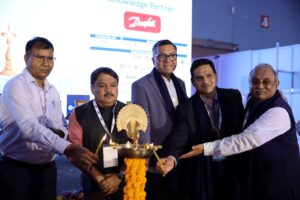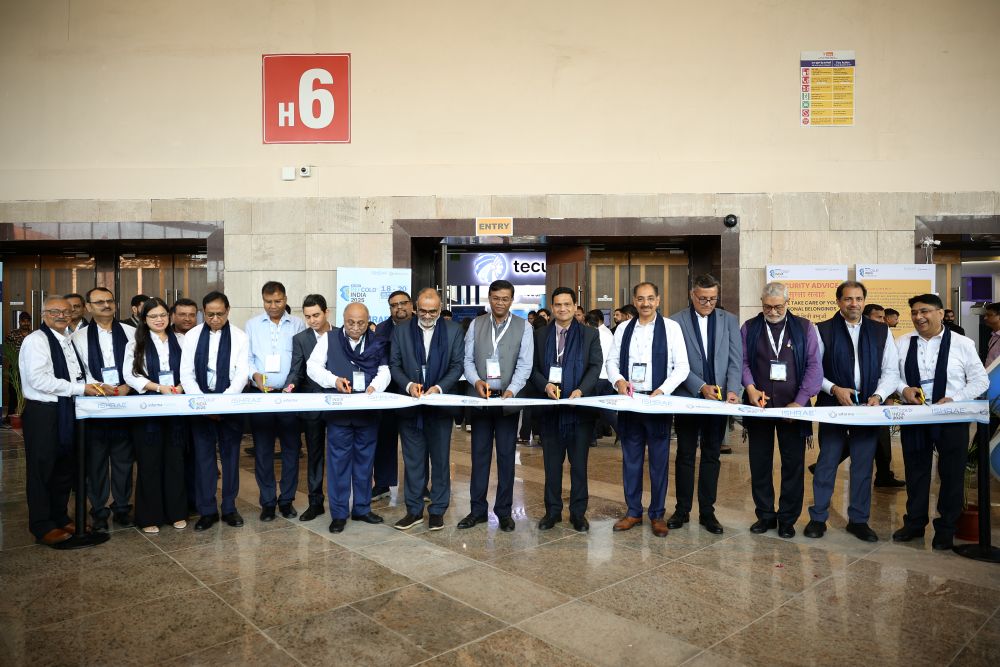REFCOLD India 2025 Makes Powerful Delhi Debut; Day 1 Draws Impressive Turnout as Industry Converges to Drive India’s $74.5 Billion Cold Chain Vision
New Delhi, 18th September, 2025: The 8th edition of REFCOLD India 2025, South Asia’s premier refrigeration and cold chain exhibition, made a high-impact debut in the capital today at Bharat Mandapam, Pragati Maidan, New Delhi. Co-organized by ISHRAE (Indian Society of Heating, Refrigerating and Air Conditioning Engineers) and Informa Markets in India, the 3-day event opened with an impressive response from industry professionals, global participants, and policymakers.
High-Profile Inauguration Marks Industry Milestone
The inauguration ceremony was marked by the presence of senior dignitaries from the Ministry of Agriculture & Farmers’ Welfare, including Sh. Pramod Kumar, Additional Secretary (Horticulture); and Sh. Priya Ranjan, Joint Secretary (Horticulture). Also present were Mr Asheesh Fotedar, Chief Operating Officer, National Centre for Cold-chain Development (NCCD); Mr R. Sarvanan, National President Elect, ISHRAE; Ms Lieny Jamg, Director, Marketing Business Partner, Copeland Asia Middle East and Africa; Mr Madhur Sehgal, Head Climate Solutions Sales, Danfoss Industries Pvt Ltd; Mr Rajnish Aggarwal, Chair, REFCOLD 2025; Mr Ashish Gupta, Convener, REFCOLD 2025, Mr Richie Mittal, President Member, ISHRAE; Mr Waleuddin Siddiqui, President, Delhi Chapter, ISHRAE; Ms Sukhda Tandon, President Elect, DCI; Mr Mukesh Aggarwal, President, FCAOI, Mr Yogesh Mudras, Managing Director, Informa Markets in India, and Mr Ritesh Modi, Finance Director, Informa Markets in India.
The inauguration of the expo, which underlines the cold chain sector’s key role in strengthening food security, driving sustainability, and accelerating economic growth, was also marked by the launch of the National Centre for Cold-chain Development (NCCD) website and the unveiling of the Energy Transition Report by the Secretary, MoA & FW.
Referred to as a ‘sunrise sector’, the cold chain industry has become integral to India’s evolving economy. Day 1 witnessed massive participation from across industries, with over 10,000 visitors anticipated across the three days, exploring innovations from over 200 exhibitors. The strong turnout underlined the cold chain industry’s rising importance as India’s market prepares to scale from USD 10.5 billion in 2024 to USD 74.5 billion by 2033.
Global Participation Drives Cross-Border Collaboration
This year’s event hosted globally renowned brands such as Copeland, Daikin, Danfoss, Carrier Transicold, Rinac, and Luve to attract professionals from diverse sectors, including pharmaceuticals, seafood, dairy, meat, agriculture, hospitality, logistics, food processing, healthcare, retail, and bakeries. The event also featured international participation in terms of visitor and buyer delegations from Nepal, Sri Lanka, the Middle East, South Africa and Kenya, creating avenues for cross-border collaboration.
Supported by prestigious associations, including the International Institute of Refrigeration (IIR), the National Centre for Cold-chain Development (NCCD), the Ministry of Food Processing Industries (MOFPI), Agriculture and Processed Food Products Export Development Authority( APEDA), Norsk Kjoleteknisk Forening (NKF), Refrigeration and Trade Association (RATA), Refrigeration and Air Conditioning Servicing Sector Society RASSS, (All India Air Conditioning and Refrigeration Association (AIACRA), and Indian Polyurethane Association (IPUA), the event serves as a hub for knowledge exchange and international collaboration. It also received support from the end-user communities such as Federation of Cold Store Owners Association (FCAOI) and JKPICCA (Jammu & Kashmir).
Industry Leaders Highlight Transformative Potential
Speaking at the inauguration, Sh. Priya Ranjan, Joint Secretary, Horticulture, MoA & FW, said*, “India today stands as the world’s second-largest producer of horticulture, with output touching nearly 365 million metric tonnes. However, post-harvest losses of up to 15% translates to nearly 15 million metric tonnes of wasted produce — a loss not just to farmers and consumers, but also to our nutritional security and economy. At the Ministry and through the NCCD, we are working to change this narrative. Our efforts include revising engineering guidelines with over 100 stakeholder consultations, digitising cold chain infrastructure for nationwide access, initiating the All-India Cold Chain Survey, and promoting energy transition to modernise and make facilities more sustainable. The goal is to reduce losses to below 5% by 2047, directly contributing to higher farmer incomes and a stronger food system,”.
He added, “Platforms like REFCOLD are critical in this journey, bringing together policymakers, academia, innovators, and industry leaders to collaborate, showcase solutions, and create customised, affordable technologies, especially for farm-gate infrastructure. With collective action, we can transform the cold chain into a robust, technology-driven backbone that not only secures our agriculture but also supports pharma, fisheries, and allied sectors critical to India’s growth.”
Dr. Sudhanshu, Secretary, APEDA, said, “India is an agrarian economy, and the strength of our cold chain will determine how effectively we reduce post-harvest losses. These losses are not only a drain on farmer incomes but also a national wastage that undermines our food security. A robust cold chain enhances the shelf life and quality of produce, benefiting both the domestic market and exports. At APEDA, we see cold chain infrastructure as a cornerstone for agri-exports, ensuring that Indian produce reaches global markets with consistent quality standards. Beyond perishables like fruits and vegetables, sectors such as dairy, meat, and fisheries also rely heavily on reliable cold chain solutions. Learning from the success stories of other countries, including developing economies, India too must adopt stronger cold chain strategies to strengthen its entire food ecosystem. APEDA has been facilitating this journey by assisting in the creation of packhouses, cold storages, and facilities at critical exit points — airports and seaports — bridging the gap from farm to foreign markets. “
He added, “Platforms like REFCOLD provide the right environment for stakeholders to identify interventions, collaborate with central and state agencies, and chart actionable roadmaps. Strengthening India’s cold chain is not a choice; it is a necessity for securing farmer incomes and expanding our global footprint.”
Sh. Vivek Kumar Singh, Director, MoFPI, said, “At MoFPI, our primary mandate is to build a strong and resilient food processing ecosystem that caters to both domestic consumption and global exports. From farm to fork, it is our responsibility to ensure safe, high-quality, and sustainable food. For this, we are driving three flagship schemes. The first is the Production Linked Incentive (PLI) Scheme, through which we aim to create global champions by incentivizing companies on the basis of sales growth. The second is the PM Formalisation of Micro Food Processing Enterprises (PMFME) Scheme, which provides credit- linked support to micro-processors along with training, branding, and handholding support. The third is the Pradhan Mantri Kisan Sampada Yojana (PMKSY), under which we extend assistance to MSMEs for establishing and expanding preservation and processing capacities across the country.Through these interventions, we are not only minimizing wastage and improving efficiency but also empowering farmers, boosting incomes, and enhancing food security.
He added, Platforms like REFCOLD India provide an excellent opportunity for dialogue and collaboration among ministries, industry leaders, and innovators. Together, we can accelerate the growth of a modern, resilient food processing and cold chain ecosystem.”
Speaking at the inauguration, Mr Ashish Gupta, Director Standard Refrigeration Pvt Ltd and Convenor REFCOLD INDIA 2025, said, “India’s cold chain sector stands at an inflection point. While the country has built 32–35 million tonnes of cold storage capacity, gaps in pack-houses, ripening chambers, and reefer vehicles still challenge efficiency. With the global refrigerated transport market set to reach USD 216 billion by 2030, India’s opportunity is immense, especially in food, pharma, and export-oriented supply chains. Policy support through schemes like PMKSY and energy-efficiency labelling is creating a fertile environment for integrated, sustainable networks.

He added, “All these efforts align with what the Indian Society of Heating, Refrigerating and Air Conditioning Engineers (ISHRAE) stands for as knowledge disseminators, working in tandem with government objectives of sustainable cold chain ecosystem. With REFCOLD, we take the initiative of bringing all stakeholders under one umbrella, with all government verticals, academia, think tank, technology companies, system integrators, and most importantly, end users and consumers of cold-chain and cold store in attendance to discuss the growth and challenges for the industry.”
Mr Yogesh Mudras, Managing Director, Informa Markets in India, said, “The refrigeration industry is evolving rapidly, with global commercial equipment projected to touch USD 161 billion by 2034, driven by food, pharma, and retail. India, too, is witnessing strong double-digit growth, with rising demand from QSRs, organized retail, and life sciences. The government’s commitments towards the industry are reshaping equipment choices, pushing innovation toward natural refrigerants and efficiency. Yet, challenges around power costs, financing, and service networks persist. REFCOLD 2025 addressed these head-on, showcasing cutting-edge technologies while fostering collaboration between manufacturers, policymakers, and end-users to future-proof India’s refrigeration and cold chain ecosystem.”
Knowledge Sessions Drive Industry Innovation and Policy Dialogue
The opening day featured packed sessions under the India Cold Chain Conclave 4.0, beginning with an Impact Analysis on Primary & Post-Harvest Management and Government Initiatives, followed by deliberations on the role of emerging states such as Kashmir and Andhra Pradesh. Experts and industry leaders also shared stakeholder insights and industry perspectives, setting the tone for collaboration. The afternoon sessions deep-dived into sustainable cold chain practices, addressing climate resilience, refrigerants, energy transition, and supply chain efficiency. This was followed by a high-energy session on innovation in cold chain technologies and business models, highlighting entrepreneurial approaches and scalable solutions. Speakers such as Dr. Yosr Allouche (IIR), Asheesh Fotedar (NCCD), and Ashish Rakheja (AEON) emphasized India’s readiness to lead the cold chain transition through innovation and global collaboration. The day also featured INSIGNIA B2B networking sessions and shortlists for the Copeland Awards 2025, celebrating excellence in sustainable products and impactful cold chain innovations.
In the coming two days, the exhibition will feature INDEE 3.0 & the IIR Seminar on Natural Refrigerants, highlighting sustainable, energy-efficient refrigeration solutions, alongside the AICCS AGM, where industry leaders will engage in strategic discussions shaping India’s cold chain future. It will host the Industry Leaders Conclave, bringing together senior executives to explore emerging trends, leadership strategies, and collaborative innovations driving the sector forward.
Recognition and Networking Opportunities
The prestigious REFCOLD India Copeland Awards 2025 will celebrate excellence in the industry in the after- hours of the show on Day 1, with categories including Sustainable Cold Chain Products, Cold Chain Impact Awards, and Special Jury Awards for Innovation. The event also featured INSIGNIA B2B networking sessions and a Hosted Buyer Programme, enabling stakeholders to forge impactful collaborations.
The Student Poster/Project Competition was also one of the engagements encouraging young minds to think out-of-the box solutions for challenges in the sector. With 258 nominations, there were 16 in the short-listed category including those from Bhutan and the Middle East.
The exhibition floor showcased cutting-edge technologies addressing India’s unique cold chain challenges, from energy-efficient refrigeration systems to IoT-enabled monitoring solutions. Exhibitors demonstrated innovations specifically designed for India’s diverse climate zones and infrastructure limitations, with a strong focus on renewable energy integration and reduced operational costs. These solutions aim to bridge the critical gaps in India’s cold chain infrastructure while supporting the country’s sustainability goals.
Policy and Investment: Creating an Enabling Ecosystem
A special focus of Day 1 discussions centred on creating an enabling policy and investment ecosystem for cold chain development. Government representatives highlighted recent policy initiatives, including PLI schemes, tax benefits, and dedicated financing options for cold chain infrastructure. Industry stakeholders and financial institutions explored innovative funding models to accelerate cold chain adoption across India’s agricultural belts and food processing hubs, with particular emphasis on public-private partnerships and cluster-based development approaches.
As REFCOLD India 2025 moves into Day 2 and 3, the event promises deeper dives into policy frameworks, energy transition technologies, and cross-border collaborations, further solidifying its status as South Asia’s largest and most influential cold chain platform.


